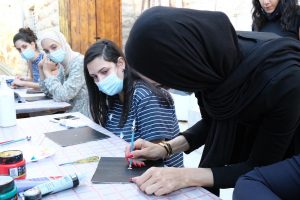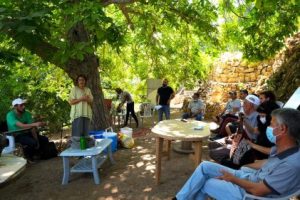The grapevine that grew in adversity
25 May 2023
Carrying on in the middle of violent conflict requires skill, resilience, and nous. For Palestinians, the last 100 years have brought colonization, expulsion, and military occupation, followed by a long and difficult search for self-determination and for coexistence with the nation they hold responsible for their suffering and loss.
According to the Civicus Monitor, the people of Palestine are “repressed.” Civic freedoms in Palestine continue to deteriorate with an escalation of attacks on civil society organizations, journalists, and human rights defenders by the Israeli Occupying Forces.
The conflict continues to be ignored by the world. Aarti Narsee, Civicus Civic Space Research Officer, recently said: “The deterioration of civic freedoms in Palestine due to increasing attacks by Israeli Occupying Forces can no longer be ignored. It’s time for democratic governments to break their silence and condemn Israel’s apartheid regime of systematic racial domination and oppression over the Palestinian people as a whole and to impose economic and diplomatic sanctions on Israel.”
Yet, the Dalia Association does its best to enable Palestinians to live flourishing lives. “Dalia” in Arabic means “grapevine.” Nearly every house in Palestine has a Dalia plant which, if you take care of it, will feed you, shelter you, and provide beauty for generations. This is exactly what the Dalia Association does. As a community philanthropy organization rooted in the dreams of Palestinians, it is “a mechanism for us to become our own donors, investors and decision makers.”
To learn how Dalia’s work is shaping up, Ese Emerhi (GFCF Global Network Weaver) and Barry Knight (GFCF Advisor) caught up with Samar Awaad, Executive Director of Dalia Association, and Lina Ismai’l, Community Programmes Officer, to learn more about their work in building community philanthropy through the Giving for Change programme.
Current situation in Palestine
Barry Knight (BK): How are things in Palestine? What’s the situation right now?
Samar Awaad (SA): Well, the situation right now – the political situation – is the Israeli occupation and lack of access to travel from one place to another for Palestinians. Sometimes, even villages within cul-de-sacs need permission to move from one place to another, and this is a challenge. In a sense, we are in an apartheid situation. I don’t know if anything quite like this situation exists anywhere else in the world. We are living in a big prison, but in the West Bank, we don’t really feel it because it’s sort of a bubble in Ramallah. If I want to travel to Jericho, I must make sure someone is with me so I wouldn’t be attacked or have my trip in some way jeopardized by the settlers. This closure limits accessibility of people, which also has an impact on implementing projects. For example, though we are implementing this programme in Gaza, we have not been able to go and visually monitor the projects, despite having two staff members there. They can’t leave Gaza and we can’t enter. And to think that Gaza is only an hour and fifteen minutes away from Ramallah [where we are]. This occupation challenge is something Palestinians live with all their lives. It’s like a dream to imagine life without occupation.
Lina Ismai’l (LI): In the past month, there’s been an escalation of violence against Palestinians. There’s a refugee camp that is now closed off and food supplies cannot enter. There’s been demonstrations and protests, even across the whole West Bank. A couple of days ago we were on a general strike. Every day, we open the newspapers and read about another martyr here and there. It’s not an easy situation. In addition to this, there are attacks on civil society organizations. This year, the Israeli military forces have attacked seven organizations, and one of them is a partner of ours – the Bisan Center. All this, of course, is in addition to the Palestinian Authorities’ enforcement of the decree of law constricting the civic space for civil society. Currently, we have concerns for us even traveling to a nearby city.
This is an excerpt from the conversation. The full piece is available on the #ShiftThePower Treehouse.



